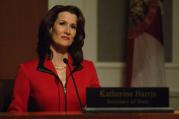Click here if you don’t see subscription options










Early on in HBO’s “Recount,” a new film about the disputed 2000 presidential election, two distinct political philosophies are contrasted. James Baker (played by Tom Wilkinson), the head of George W. Bush’s operation in the contested state of Florida, vows to win by any means necessary. “This is a street fight for the presidency of the United States,” Baker tells Bush’s staff. “I’m told that we have a well-oiled operation just waiting to clobber us. It’s not going to get more political than this.” In the very next scene, Warren Christopher (played by John Hurt), the head of Al Gore Jr.’s operation, pledges to uphold a higher morality. “We want to proceed as if this is a proper legal process, not a political street fight,” Christopher says to a top Gore aide, adding that they must put “country above party.”
The juxtaposition highlights the movie’s main theme: Democrats are naive but fundamentally virtuous, while Republicans are modern-day Machiavellians. This idea is an unquestioned tenet among Democratic leaders and activists. Barack Obama’s campaign, for example, operates on this assumption. His aides have invoked the specter of the Willie Horton ads of 1988, the Florida recount of 2000 and the “swiftboating” of John Kerry in 2004.
Without getting into the veracity of this claim just yet, I submit that it is borne of our low-consensus, highly pluralistic society. Since the culture wars broke out in the late 1960s, we have come to think of ourselves increasingly as members of different camps. We live in red states or blue states; drink beer or wine; go to church or don’t. This divide is even stronger among our political elites; it’s no accident that the film is about the 2000 election, the first public recognition of our red-state/blue-state divide. These leaders and activists see themselves as having very little in common with one another.
This sense of apartness is underlined in "Recount.” Democrats are portrayed as decent and respectable while Republicans are glorified rapscallions. Ron Klain Jr. (played by Kevin Spacey), the head of Gore’s Florida campaign, is crestfallen upon hearing after Gore’s apparent victory that he will not receive a promotion in a new administration; but he soldiers on for Gore because, well, that’s who he is. Katharine Harris (played by Laura Dern), the Florida secretary of state, is a vain, lackey for the Bushies. Although this portrayal of Harris is accurate, it fails to note that Harris was also under-qualified for the job.
The liberals-good, conservatives-bad formulation is a myth. Al Gore was not above the fray. He sought a recount in only four counties, all of which were heavily Democratic. Gore’s advisors were not disinterested pols. His aides argued against counting military ballots that were not postmarked, even though most military personnel abroad do not have easy access to postal equipment.
Republicans played rough, too, of course. The Bush team should have asked for a statewide recount of the ballots, a proposition endorsed by the nation’s editorial boards. Instead, Bush’s advisors rejected the idea on the grounds that such a recount could only diminish his lead.
The reality, of course, is that politics is a dirty business. This natural law applies to local zoning board meetings as it does to presidential recounts. But I suspect that this notion is exacerbated in a highly pluralistic, low-consensus society. We tend to focus on the misdeeds of our enemies while forgetting those of our own.
What “Recount” and other cultural products like it should make us reconsider is the value of a highly pluralistic society. We are told constantly that pluralism begets tolerance and respect. But does it really? In “The Mindless Menace of Violence,” a speech delivered in response to the assassination of Martin Luther King, Jr., Bobby Kennedy warned that pluralism can easily beget violence and oppression:
When you teach a man to hate and fear his brother, when you teach that he is a lesser man because of his color or his beliefs or the policies he pursues, when you teach that those who differ from you threaten your freedom or your job or your family, then you also learn to confront others not as fellow citizens but as enemies, to be met not with cooperation but with conquest; to be subjugated and mastered.
